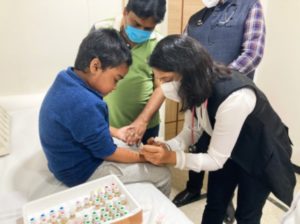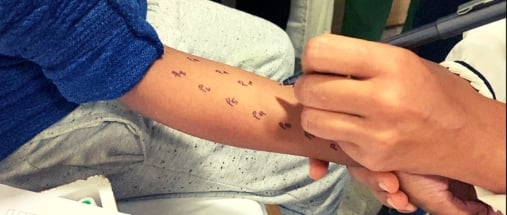
Dr. Ritika Chhawchharia, MBBS, MD (Pediatrics), DNB (Pediatrics), pHERMES, shares information about skin prick allergy tests, what they are and why they may be required in children.
What is a Skin Prick Test for Allergies?
Skin prick test for allergies is used to identify the allergen responsible for triggering symptoms like skin rash, repeated cough and cold, sneezing, recurrent stomach pain etc due to allergies. During a skin prick test, your skin is exposed to suspected allergy-causing substances (allergens) and is then observed for signs of an allergic reaction. Along with your medical history, allergy tests may be able to confirm whether a particular substance you touch, breathe or eat is causing symptoms.
Skin prick test is safe for children and adults, and can be performed by an allergy specialist doctor. It gives results instantaneously and reliably. It can be performed in infants as young as 10 months.
Why do children need a skin prick test?
A skin prick test is often advised by an allergy specialist, to confirm the diagnosis of allergy and to remove these allergens from an individual’s surroundings. The skin prick test is widely used to diagnose the following allergic conditions:
- Allergic Rhinitis
- Asthma
- Atopic Dermatitis
- Urticaria
- Food allergy
By identifying the triggering agents, better avoidance measures can be taken. Based on the skin prick test results, further treatment options like allergen immunotherapy can be sought.
How is the skin prick test done?
A small drop of the allergen extract is placed on the forearm (or back in infants) after cleaning it.
Then the doctor lightly pricks the surface of your skin under each drop so a small amount of the allergen seeps into the skin. The procedure isn’t usually painful but some people find it slightly irritating.

Children are usually intimidated by the procedure, although every effort is made to make the child comfortable. A positive control (histamine) and a negative control (normal saline) is also inserted to confirm the validity of the test.
The arm (or back) is then observed after 15-20 minutes for presence of any reaction. In case your child is allergic to something, a red itchy bump will develop at the site of prick. This test can be performed to test for more than 50 allergens at a time.
What preparations do we need for a skin prick test?
Before scheduling a skin prick test, all anti-allergy medicines that your child might be taking need to be stopped for a week. Nasal steroids and inhaled medications can be continued. Any skin creams and ointments must be avoided on the day of the test. You must inform your doctor in advance about any medications that the child is taking.
If your child has had a severe, sudden, life threatening reaction to any substance then this test cannot be performed.
In case of eczema or psoriasis involving the arm, the allergy test has to be deferred until the rash subsides.
Where can I get a skin prick test?
This test is performed by allergy specialist and a pulmonologist, Dr. Ritika Chhawchharia, at Sitaram Bhartia Institute of Science and Research, New Delhi. You can contact Mrs Alpana (+918826391002) for booking an appointment for a skin prick test.

